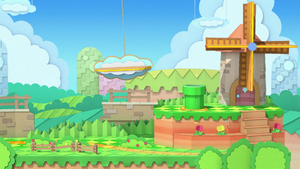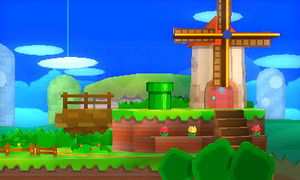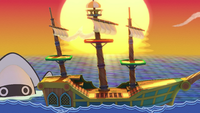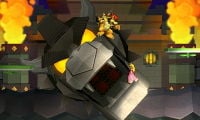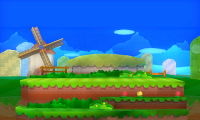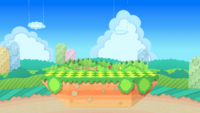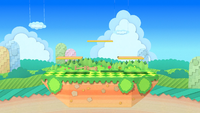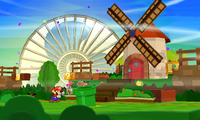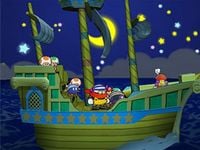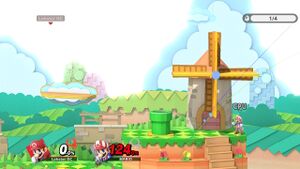Paper Mario
- This article is about the stage. For other uses, see Paper Mario (disambiguation).
| Paper Mario Paper Mario | |
|---|---|
 Paper Mario in its Hither Thither Hill form. | |
| Universe | Mario |
| Appears in | SSB4 (3DS) Ultimate |
| Availability | Starter |
| Crate type | Presents |
| Articles on Super Mario Wiki | Hither Thither Hill S.S. Flavion |
Paper Mario (ペーパーマリオ, Paper Mario) is a stage in Super Smash Bros. for Nintendo 3DS and Super Smash Bros. Ultimate.
Stage overview[edit]
The stage is based on three areas from the Paper Mario series. The layout shifts between the three in a pop-up book style, with each transition being accompanied by a rising or falling xylophone sound effect.
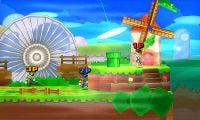
The starting variation is based on Hither Thither Hill from Paper Mario: Sticker Star. It features a windmill that will spin under a heavy player's weight and a Warp Pipe that pushes into the air anyone that stands on it (Smash 4 only). Near the end of this variation, the Fan Thing appears in the background and generates strong wind which blows away several stage elements and pushes fighters to the right of the stage. When the stage transitions from this form, the cloud going up will KO anyone on it.
The second variation is based on the S.S. Flavion, a ship from Paper Mario: The Thousand-Year Door. The ship may be accompanied by a giant Blooper, a recurring boss in the series: it can form waves in the water that can rock the boat and carry players. Another possible occurrence is the appearance of the Whale from the original Paper Mario, which raises the ship with water spouting from his blowhole. This stops the ship's rocking and carries it closer to the upper blast line.
A giant pop-up book appears in the background, and from it emerges the last variation: Bowser's Sky Castle from Paper Mario: Sticker Star, which features a large bust of Bowser's head plus two floating platforms (modeled color-wise after the Koopa Clown Car) that move up and down on either side. The head's eyes will occasionally glow to denote what it does next: Red means it will start spinning, making it hard to stand on, and white precedes the head's jaw clamping shut, which deals moderate damage and knockback to anyone inside it.
The edges on Bowser's head cannot be grabbed, potentially causing KOs when it spins.
After a while, the castle retreats into the closing book as the stage switches back to Hither Thither Hill and the cycle repeats. During this brief transition, the stage temporarily gains a walkoff surface on the right side; a few seconds later, it will sink into the lower blast line.
Ω forms and Battlefield form[edit]
In Super Smash Bros. for Nintendo 3DS, the Ω form takes place on a completely flat version of the Hither Thither Hill part of the stage that extends below the blast line. The stage also does not transform.
In Super Smash Bros. Ultimate, the Ω form and Battlefield form are set on a slightly redesigned version of SSB4's Ω form; however, the main platform no longer extends below the blast line and is resized and reshaped to match Battlefield. The windmill is also absent in the background. The three soft platforms of the Battlefield form resemble the platform attached to the hanging cloud in the Hither Thither Hill phase of the normal stage.
Hazards Off[edit]
With hazards off in Ultimate, the stage will stay in the Hither Thither Hill phase for the duration of the match. The fan does not appear or cause wind. The windmill blades will still tilt if players stand on them, and the cloud platform still sways back and forth.
If the Paper Mario Medley is selected as the song, it will only play the Hither Thither Hill portion.
Origin[edit]
Hither Thither Hill comes from Paper Mario: Sticker Star. In that game, Mario had to use the Fan sticker to access the windmill, since the blades were blocking its entrance (oddly, the windmill blades no longer reach far enough to block the entrance in Smash). When he used the sticker, a cutscene played where several nearby obstacles, including the windmill's blades, were blown away. When used in battle, the Fan sticker would blow all enemies around.
The S.S. Flavion appeared in Paper Mario: The Thousand-Year Door, where it was the ship of Flavio. During Chapter 5, Mario and his party had to use it to sail to Keelhaul Key. After several days of sailing, they were ambushed by several Embers. The ship wrecked on Keelhaul Key, and its scraps were used to set up camp on the island.
An enemy from the original Super Mario Bros., large Bloopers are recurring bosses in the Paper Mario series, most notably in the first three (Paper Mario: Sticker Star and Paper Mario: The Origami King feature Gooper Blooper from Super Mario Sunshine instead). The specific Blooper in the second segment bears a strong resemblance to the one fought in The Thousand-Year Door.
The Whale from Paper Mario, who took Mario and his party to Lavalava Island, makes an appearance in the second segment, using its water spout to lift the S.S. Flavion a notable distance above the water. The sunset background used in this section is the same one from Riverside Station in Chapter 6 of The Thousand-Year Door.
While having Bowser's Castle in the air is a reoccurring element of the Paper Mario series (dating back to the original Paper Mario), the third section is specifically inspired by Bowser's Sky Castle from Paper Mario: Sticker Star. After the floating castle retreats from Gate Cliff, Mario and Kersti face off against Bowser in the final fight for the last Royal Sticker. The spinning, clamping, and changing eye color of the Bowser head are exclusive to the stage's Smash iteration; in Paper Mario: Sticker Star, it merely functions as the entrance into the castle.
In Ultimate, the overall artstyle for the stage is brighter and more influenced by the realistic cardboard-crafted designs of Paper Mario: Color Splash. As an example, the path and sorrounding grassy terrain in the Hither Thither Hill phase of the stage are almost identical to the terrain found in the forest levels Mario and Huey traverse while on their quest to recover the Big Paint Stars, such as Mondo Woods and Sacred Forest.
Gallery[edit]
Super Smash Bros. for Nintendo 3DS[edit]
The Hither Thither Hill section in Super Smash Bros. for Nintendo 3DS.
The S.S. Flavion section in Super Smash Bros. for Nintendo 3DS.
Super Smash Bros. Ultimate[edit]
Incineroar, three Pikachu, and two Pichu on the stage.
Names in other languages[edit]
Trivia[edit]
- In Ultimate, if the stage transitions back to the beginning while the speed is set to 1/4 in Training Mode, after a few seconds the background will vanish, exposing the void. The void quickly becomes a bright white light due to the game's renderer not clearing the framebuffer, causing anything in front of the void to be rendered multiple times, making that area bright enough for bloom to occur, leading to recursive bloom. The bloom effect becomes strong enough that it starts to mask characters in front of it.
- Fittingly, the only thing that can consistently block out the white light behind it is the Black Hole item, which will appear to absorb the light in the area around it.
- If the game is set to frame advance and frozen, it can be seen that the void for this stage is indigo.
- Paper Mario and Pac-Maze are the only non-DLC stages in Super Smash Bros. for 3DS from universes with a playable character to not appear in All-Star Mode.
- Interestingly, in the SSB4 Ω form of the stage, it appears there is a small gap underneath the stage where a fighter could go, but in fact the stage's collision box goes all the way to the blast line. This is most noticeable when using a wall-cling capable character, as it can appear they are clinging to air.
- In Ultimate, the following Assist Trophies can only appear on the Battlefield and Omega forms of this stage: the Moon, Nightmare, Andross, Ashley, Kapp'n, Devil, Dr. Wright, and the Squid Sisters. Additionally, the following Poké Ball Pokémon can only be summoned on the stage's Battlefield and Omega forms: Lugia, Palkia, Lunala and Marshadow.
- The Hither Thither Hill segment is the only one out of the three whose corresponding song in Paper Mario Medley is accurate to the source material; while "Blue Skies, White Clouds" played in the level in Paper Mario: Sticker Star, and is reflected properly in Smash, the S.S. Flavion segment uses the Rogueport theme, and the Bowser's Sky Castle segment uses the "Battleship" theme, which played in Bowser Jr.'s Flotilla (which may be justified due to the fact that the entrance to the castle, of which the stage in Smash is based on, is devoid of any music at all).
